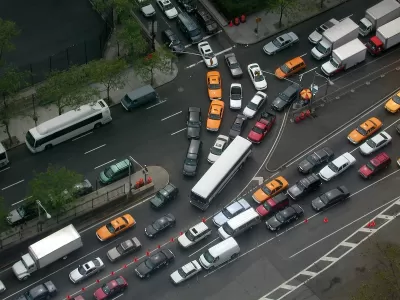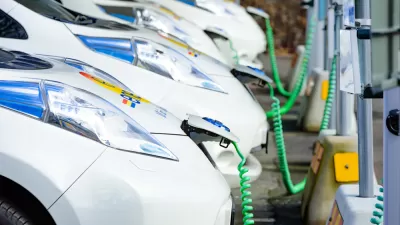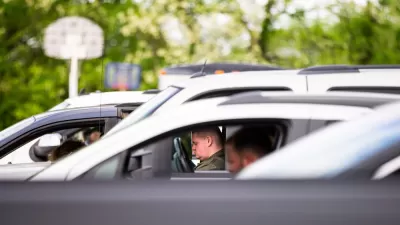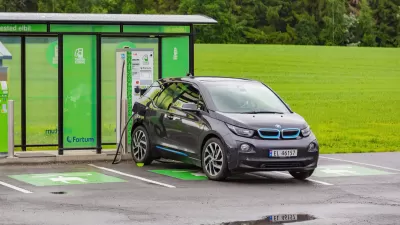Encouraging Americans to drive less — and supporting cities where it’s possible to do so — could save the country trillions more than just electrifying the transportation sector.

A new study finds that reducing private car ownership and miles driven in the United States could save a collective $6.2 trillion more than just focusing on shifting to electric vehicles.
As Kea Wilson explains in Streetsblog USA, the report from the Union of Concerned Scientists “states that giving Americans the freedom to choose among multiple modes of travel is "key to the climate transition" — and that making ‘visionary but feasible’ changes, like shifting land use patterns and investing in walking, biking, and transit, could get our country to the critical net zero milestone.”
According to the report, reducing vehicle miles traveled by roughly 27 percent by 2050 could eliminate the need for $201 billion in new infrastructure and save the nation $128 billion in public health costs. “And then there's the staggering costs of car crash deaths themselves, 250,000 of which could be avoided if VMT was cut, along with 3.7 million crash injuries that often cost far more than a fatality.”
Americans would also save almost $6 trillion on car payments, fuel, insurance, and other costs associated with vehicle ownership.
Kevin Shen, the lead author of the report, highlights the need for options, saying, “if you look into the more recent research [about] what actually benefits people in the U.S., it is not automobility. Providing a multitude of options — that's what actually benefits people.”
FULL STORY: Report: Confronting Car Dependence Won’t Just Help With Climate Change; It’s a $6.2 Trillion Opportunity

Study: Maui’s Plan to Convert Vacation Rentals to Long-Term Housing Could Cause Nearly $1 Billion Economic Loss
The plan would reduce visitor accommodation by 25,% resulting in 1,900 jobs lost.

North Texas Transit Leaders Tout Benefits of TOD for Growing Region
At a summit focused on transit-oriented development, policymakers discussed how North Texas’ expanded light rail system can serve as a tool for economic growth.

Using Old Oil and Gas Wells for Green Energy Storage
Penn State researchers have found that repurposing abandoned oil and gas wells for geothermal-assisted compressed-air energy storage can boost efficiency, reduce environmental risks, and support clean energy and job transitions.

Opinion: DC Encampment Sweeps Hide, but Don’t Solve, Homelessness
President Trump recently ordered the clearing of encampments built by unhoused people on federal land in Washington, D.C.

Santa Barbara Could Build Housing on County Land
County supervisors moved forward a proposal to build workforce housing on two county-owned parcels.

San Mateo Formally Opposes Freeway Project
The city council will send a letter to Caltrans urging the agency to reconsider a plan to expand the 101 through the city of San Mateo.
Urban Design for Planners 1: Software Tools
This six-course series explores essential urban design concepts using open source software and equips planners with the tools they need to participate fully in the urban design process.
Planning for Universal Design
Learn the tools for implementing Universal Design in planning regulations.
Ascent Environmental
Borough of Carlisle
Institute for Housing and Urban Development Studies (IHS)
City of Grandview
Harvard GSD Executive Education
Toledo-Lucas County Plan Commissions
Salt Lake City
NYU Wagner Graduate School of Public Service





























